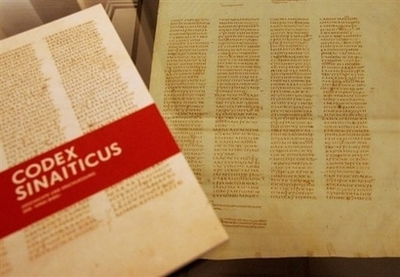 The first online phase of the Codex Sinaiticus digitization project headed by the Institute for Textual Scholarship and Electronic Editing at the University of Birmingham, in cooperation with the British Library and the three other holding libraries, will be going live Thursday 24 July 2008 at www.codexsinaiticus.org.
The first online phase of the Codex Sinaiticus digitization project headed by the Institute for Textual Scholarship and Electronic Editing at the University of Birmingham, in cooperation with the British Library and the three other holding libraries, will be going live Thursday 24 July 2008 at www.codexsinaiticus.org.
Most news services have been covering this story:
- The Associated Press
- New York Times (Reuters)
- AFP (via Yahoo! News)
This is an exciting project — I hope other similar projects will be inspired by this one so that more primary texts will be available online. From the available preview, the site should be spectacular.
For more information on Codex Sinaiticus, please see the profile I wrote as part of my Textual Criticism of the Hebrew Bible series.

Pingback: Codex: Biblical Studies Blogspot » Blog Archive » Nerds Galore!
It is certainly good news that Sinaiticus is going online. It’s one of a tiny handful of books that the British Library have digitised in the last 10 years.
But we can’t expect more; because I’m getting messages that the whole thing is a bit of a scam. The images are all real; but they cost something like $4,000 each to produce, when you look at the budget (I have no final figures yet).
Of course no conceivable photography of pages in a book, however fragile, could cost that. The equipment is an overhead, but doubtless $40,000 would buy the ultimate resolutions possible. Staff time is perhaps $30-$40 an hour. So what on earth do they do, at that price, for 100 hours per image?
In truth the project may well be a fraud; a trick to obtain a very large sum of money, and spend most of it on other things that the staff consider more important. At that sort of price, of course, they’ll be very happy to ask for more money.
I hope I’m wrong; I don’t yet know the details. But they most certainly did something of the kind when they photographed two Gutenberg bibles. It cost $22m, I believe. They took a couple of thousand images. Average price per image was $10,000. Form your own opinion about that!
It’s a nice way for the staff to feed money into payrises and new equipment, instead of photographing masses of books and making them available online. It’s not so nice for the rest of us.